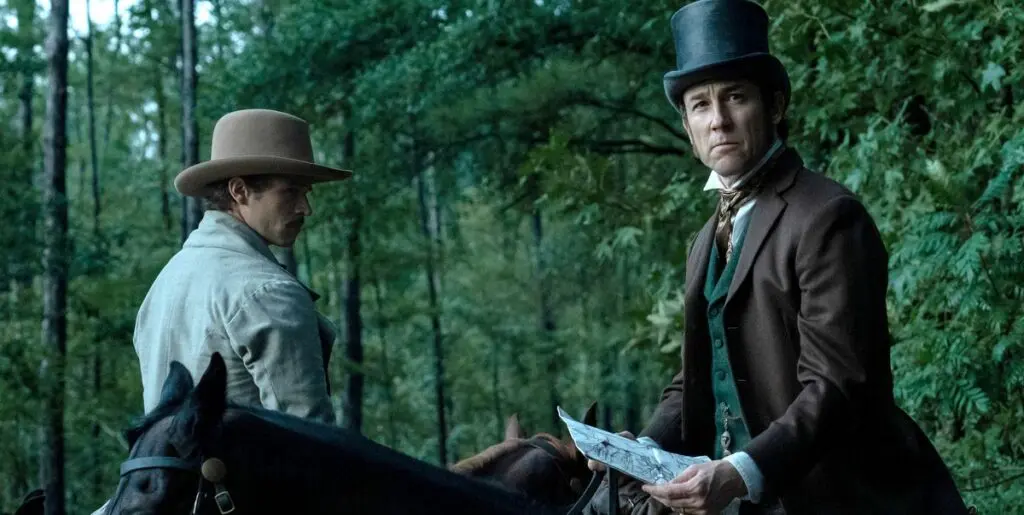Summary
Powerful, moving, and laced with significance, “The Final Act” is one heck of a finale, and sends Manhunt out on its highest note yet.
The ending of Manhunt begins, fittingly, in the past. More specifically, three months before Abraham Lincoln’s assassination in Ford’s Theatre, on a night in the White House when Lincoln both appointed Edwin Stanton as War Secretary — he calls him Mars, the Roman God of War — and learned his son had mere days to live.
It’s telling, this, both because it represents a full-circle moment — seeing Stanton’s initial appointment before we transition to his orchestration of the so-called “Trial of the Century” to bring Lincoln’s killers to justice — and because it shows Lincoln’s character. He and the doctor lie to his wife about their son’s condition so she can enjoy “one last night of peace.” And yet he still slips out of the room amid his grief to discuss business.
For most men, this would be selfish careerism. But Lincoln’s business is the entirety of America and the beginnings of emancipation. Here, he’s a statesman in the truest sense of the term.
Jefferson Davis Referred to John Wilkes Booth As His “Pet”
Judge Holt lays out the particulars, and the problem immediately becomes apparent — there’s so much kerfuffle when Jefferson Davis is named as a conspirator that the court has to be adjourned five minutes into the trial.
“My cause lives and breathes, and always will,” says an unrepentant Davis to Stanton from his cell, which is an especially powerful line given the political schism that seems more pronounced now than ever. He’s understandably smug, but Detective Baker puts forth a potential solution to Stanton in the form of Conover, who claims to be in possession of a document known as the “Pet Letter”.
That was Davis’s nickname for John Wilkes Booth. He called him his “pet”.
Mary Simms Is A Star Witness
In the meantime, the trial begins in earnest, with witnesses for both the defense and the prosecution popping up to remind us of events we saw earlier in the season and bits of evidence collected along the way. It’s fascinating to see how neatly this all comes together, how every event and person involved, however seemingly insignificant, matters a great deal.
Mary Simms also emerges as a crucial component of the trial before she even takes the stand, talking Milo into testifying on her behalf and giving Louis Weichmann a nudge in the right direction. She’s a shining example of real character and bravery, the kind which America was built on the back of.
Milo takes the stand and tells the truth. So does Mary. And so does, crucially, Louis Weichmann, who reveals not only details about his sexual relationship with John Surratt but states outright that, even though he has every reason to defend him, he believes everything Mary said about him on the stand.
Stanton says what we’re all thinking: “You’re good at this, Miss Simms.”
Conover’s Testimony Provides Doubt
Conover’s testimony is especially impactful. He’s up-front about this wheeling and dealing nature, his role as a spy for both the War Department and the CSS, and his firm belief that not only did Jefferson Davis know about the plot to assassinate Abraham Lincoln but gave the order himself to his “pet”, John Wilkes Booth.
But he also casts serious doubt over his claims by “misspeaking” and getting a crucial date wrong. This turns out to be essential since when the court reconvenes and a verdict has been rendered, there is insufficient evidence to support the charge of grand conspiracy. The chief judge nonetheless makes a point of saying that he believes Davis is as guilty as Booth, but it’ll be for further inquiries and history to prove it.
What Is The Outcome of the Trial?
In the meantime, sentences are handed out to those in the courtroom, read aloud by Stanton. Mary Surratt, Lewis Powell, George Atzerodt, and David Herold are all found guilty and sentenced to death. Edward Spangler is found guilty and sentenced to six years imprisonment. Samuel Mudd is found guilty and sentenced to life imprisonment and hard labor.
Some matters are left nebulous. Conover’s wonky testament is implied to have been influenced by George Sanders and a package he sent Conover from London. And Stanton’s removal of 18 pages of Booth’s diary, presumably implicating him in some capacity, is covered up — the acknowledgment is more for the conspiratorial sorts who know that the popular theories include Lincoln’s assassination being revenge for an attempted assassination on Jefferson Davis, which Stanton orchestrated, and the somewhat wilder claim that Stanton himself was a part of the conspiracy.
Epilogue
In the final scenes of the season, Andrew Johnson replaces Stanton as Secretary of War and chooses the worst venue to give him the news — a fundraiser for the Freedmen’s Bureau (ever the scumbag). With a final flashback to a meeting with Abe he had the day before his assassination in which he attempted to resign from his position and Abe assured him that he and the country needed him to stay the course, Stanton barricades himself in the War Department.
An epilogue informs us he stayed there for three months, retaining his position. Johnson became the first U.S. President to be impeached, as Stanton said he would be. By one vote he remained in office but did not win a second term.
John Surratt Jr. was extradited to the United States but was not convicted. He bragged about his association with Booth across America.
Five months after the trial, the 13th Amendment was ratified and slavery was abolished across the United States. Six months later the 14th Amendment was passed, and Black citizens were granted citizenship and equal protection.
Manhunt ends on Christmas Eve, four years after the assassination, with Edwin Stanton being nominated as a Supreme Court Justice, finally able to finish Lincoln’s work, and then dying in his chair from asthma-related organ failure before he ever got the chance to.
In voiceover, Mary Simms tells us that two months after Stanton passed away, the 15th Amendment to the U.S. Constitution was ratified. It guarantees U.S. citizens regardless of race or previous enslavement the right to vote. It was the last of Lincoln’s three Reconstruction Amendments.



